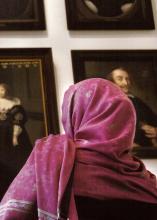Amsterdam, Netherlands
Russell Shorto recently called Amsterdam “the world’s most liberal city,” and indeed, its citizens take pride in this international reputation. The Netherlands is well known for its liberal attitudes towards drug enforcement, legalized prostitution, and gay rights, and tolerance is heralded as a centuries-old national virtue. Recent events, however, have brought this self-congratulatory attitude into question. In debates over immigration and multiculturalism, public commentators from across the political spectrum have argued for the limits of tolerance and the need to defend Dutch national identity against intolerant views, especially those associated with Islam.
For example, in 2009, politician Geert Wilders proposed a “headrag tax” in the Dutch parliament which would be imposed on wearers of Islamic headscarves. Though the ruling coalition dissolved before a vote could be held, Wilders’s inflammatory suggestion pandered to views shared by a broad swath of the Dutch population. Since the explosive murders of politician Pim Fortuyn in 2002 and film-maker Theo van Gogh in 2004, large segments of the Dutch populace have expressed fear, anxiety, revulsion, and anger towards Dutch Muslims, whether recent immigrants or the children or grandchildren of so-called “guest workers” from Morocco and Turkey who helped power the Netherlands’s economic recovery after World War II.
This program contextualizes these debates by exploring the role of the concept of tolerance in the narratives of Dutch national history and in contemporary debates about the place of secularism, public religion, cultural integration, and gender in Dutch identity. Using Amsterdam as an historical, geographic, cultural, and political site of analysis, we will explore Dutch ideas and practices of tolerance, particularly since World War II, and how these historical legacies are mobilized in conflicting ways in contemporary debates over national identity. Dutch academics, students, cultural practitioners, and politicians will serve as interlocutors for our discussions, and students will be asked to reflect on how these debates intersect with their own experiences, both abroad and at home. In the first half of the program, historical and theoretical analysis will be integrated with visits to Amsterdam’s many monuments and memorials, from the globally known Anne Frank House to recent additions such as the Monument of Awareness on Surinam Square. In the second half of the program, students will work on individual and collaborative projects that contribute to debates over cultural identity.
- CHID 471: Tolerance, Religion, and Gender (5 credits)
*Note that the fees stated above do not include some additional costs, including, but not limited to: airfare, Study Abroad Insurance (about $42/month), and personal spending money. Remember that these costs will differ by program. Be sure to read our Fees, Financing, and Withdrawal information for details about the fee structure and payment schedule.
